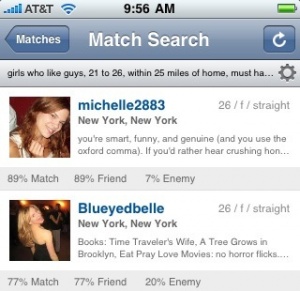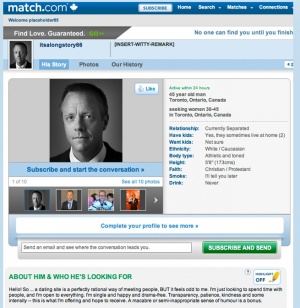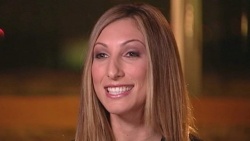Online Dating
Online dating is the "use of websites that provide a database of potential partners--typically in close geographical proximity--that one can browse and contact, generally for a fee[1]." Popular online dating websites include Match.com, eHarmony, okCupid.com, chemistry.com, and plentyoffish.com. Online dating websites allow individuals, couples and groups to communicate over the Internet to find specific types of relationships. The objective of these sites are to create personal, romantic, or sexual relationships. This matchmaking is based on personal information, such as age, gender, location, interests and hobbies. Some sites allow for picture posting and offer message boards, video messaging and chat rooms.
Online dating is almost as old as the internet itself. The first service of singles searching for mates was documented in the 1700s, in service ads in the modern newspaper. This spark from the print media quickly spread to more digital types of media like the telephone and VHS, when people started to use more virtual means of communication, making the Internet the obvious next way for peopel to meet. The first instances of online websites that hosted dating services were Kiss.com, Match.com, and Friendfinder.com, taking advantage of the speed of the internet and the visual aid of pictures to attract a stable market of singles. [2] Not only was it natural for dating to eventually spread to the internet, early internet providers also encouraged this community by directly targeting digital ads and messages towards single men and women to use the Internet for early "chat" and "forum" features. Along with messages in pop-culture about the advancement of communication with technology and the growth of social media sites like Myspace and Facebook, online dating has turned into a much more accepted alternative to meet people. [3]
The online dating industry is currently experiencing strong growth, making it one of the most profitable Internet businesses. Online dating sites are characterized by detailed user profiles and recommender systems.
Contents
Popular Use
Despite the economic recession, online dating websites have reported increased traffic to their sites that may be due to the unemployed having more time on their hands. Likewise, online dating is an inexpensive alternative to meeting people for relationships, contributing to its popularity. It has been found that one in five relationships now originate online and three in five gay couples met online[4].
Relationships formed through online dating sites do not always constitute a romantic one, and if so, do not always progress solely through virtual processes. It is found that many users choose to arrange a physical encounter rather quickly instead of taking the time to get to know their "partner" exclusively online. Most users meet physically in order to get to know each other better, thus altering the web service as only a tool for facilitating the initial meeting.[5]
The stigma of utilizing online dating services has greatly diminished as a result of the ubiquity of social networking sites and the commonality of sharing information and interacting with others online. Furthermore, many users of online dating sites have had prior experience with social networking sites.
Niche online dating sites have become popular, some focusing on specific demographics such as race, religion, sexual orientation, and age. For example:
People are able to search for people with similar interests and traits. Prior to online dating, singles were forced to seek out others in places they frequent, such as churches, bars, or nightclubs. However, the invention of these websites have allowed people an easier, more convenient way others with similar interests. People have begun to eliminate people from the dating pool because they do not subscribe to these niche websites. Baby boomers have increasingly turned to online dating with people fifty-five and older visiting American dating sites more than other age groups.
Online dating has shifted cultural norms of meeting potential spouses in everyday life, to researching and ensuring that they possess qualities or at least list qualities that they desire.
Even popular social networking sites such as Facebook have gained much activity from online dating. Mainly, people meet others through a variety of apps, some of which are made specifically more dating, while others are games or other media apps with a social element to them. [6]
Virtual Dating
With the increasing popularity of avatars and the virtual world, the popularity of dating in the virtual world has also increased. User create avatars to resemble themselves, or alter egos, to interact with other avatars and form relationships. These avatars function in the virtual world and have relationships with other avatars controlled by users.
People may resort to this for many reasons. Some find it hard to connect with others face to face, and are more comfortable connecting through a keyboard and computer screen. Others lack the confidence to put themselves out there so a virtual relationship is real enough to feel involved and intimate with another, but far away enough from reality to not have to deal with any "real" emotions. Online daters are able to portray themselves in a way that they feel comfortable and confident - allowing much room for misleading information [7].
Sex
Some online "dating" platforms exist (or at least function independently of intent) solely to facilitate sexual encounters. Examples include the "Casual Encounters" section of CraigsList, Adam4Adam, or AdultMatchDoctor. This purely physical platform has even been extended for use with SmartPhones apps like Grindr and Blendr. The profileration of websites like these are an indicator of the increase of "hookup culture," a prominent part of modern society as explored through shows like College Hookup Culture[8] and The Boys and Girls Guide to Getting Down[9].
Profiles
Users interact with each other through the use of profiles. Users tend to make their profiles more favorable to others, the most common exaggerations being in appearance, marital status, and career.
There is a complex interaction when a user builds a profile. Two personalities, the "true self" or the "traits or characteristics individuals possess and would like to but are not usually able to express" and the "actual self" or "traits or characteristics that individuals possess and express in social settings," are utilized. Users tend to emphasize the "true self" than the "actual self," because the user can display the favorable qualities of one's self that are not apparent in physical social situations.
The interactions within an online dating site are "highly reflexive processes" in which users must "contend with a perpetual cycle of self-disclosure opportunities," such as revealing personal data and feelings. Many users are hesitant about the reality of profiles and the anonymous nature of the Internet, participating in the cycle of self-disclosure to reduce skepticism in potential partners. The building of trust through the process of sharing information mimics the progression of trust in relationships formed offline.
The process of creating a profile is a continuous one. Many users frequently edit their profiles to appear more attractive to other users. In certain cases, users even tailor their profile information to target specific users.
Users of online dating sites tend to be more discriminatory toward other users, emphasizing attractiveness in profile pictures more often online than in offline environments. This competition amongst users leads to exaggeration of physical appearance as many believe that other users are more likely to be directed toward attractive profiles.
Despite the fact that users admit that their profiles contain deceptive information, users were more critical of misleading profiles.
Recommender Systems
Many online dating sites offer a recommender system which pairs couples based on their profile information. The recommender system matches individuals with several shared interests based on the assumption that shared interests lead to a successful relationship. While these types of recommendations are prevalent in many websites, not only online dating sites, some tend to be more accurate than others.
Ethical Implications
There are various ethical implications that arise with online dating websites, including sexual predators, the possibility of infidelity, discrimination, exploitation and questionable dating sites.
Various critics, including modern Luddites, have focused on online dating sites as evidence of the deteriorating morals of human relationships caused by technology. Some arguments include that online dating sites seek to commodify human intimacy, and reduce the sanctity of love to something that can be advertised, bought, and found through a search engine[1].
Information transparency is an ethical issue that exists in online dating that is irrelevant in an offline environment. People will Google snippets of information garnered from the online dating sites in order to gain more (and especially truthful) information on potential suitors.
Predators
In 2010, Carole Markin sued Match.com, an online dating site, for failing to perform background checks on its users. On a date arranged through the site, she was sexually assaulted by a registered sex offender, Alan Paul Wurtzel[10]. The court case brought up issues of relationships facilitated through online interactions, specifically about the anonymity and deceitful techniques of users. Recently, sex-traffickers have entered the online dating world, sending handsome "baiters" to lure women on dates, abducting them into the sex-traffic ring. This is especially common on less reputable, usually free sites that attract young, lower-class women and teenage girls[11].
The free dating sites set up the possibility for pedophile breeding grounds, where anyone can sign up for free (although there are age requirements, only a fake year of birth needs to be submitted for access). Some users have taken it upon themselves to set up fake children's accounts and "troll the pedos," as YouTube user BlueGenitalWarts did. He would pose as an underage girl and set up times to meet men from plentyoffish.com and confront these men dressed as Batman (often accompanied by Flash) and a video camera. His films have since been removed from YouTube.
Infidelity
Other ethical implications include cheating and infidelity through online dating sites. The Internet has become the most common setting for infidelity today. Many married men and women, or men and women in committed relationships, find sexual thrills in meeting people online, looking to fill their needs that aren't being met in their current relationships. The online dating environment makes infidelity easier. Cheating is also common in virtual communities. Users in committed relationships will engage in other relationships through their avatars in virtual worlds. The question arises if this is considered infidelity.
There have even been cases where the infidelity has been lifted off the virtual world, and into the real one. This unethical value of online dating sites can allow room for misrepresentation and affects lives in reality. The most hard-hitting fact is that this infidelity is not only sponsored by online dating or cheating sites, but any social network or online platform in general. For example, a case of virtual cheating turned into real-life infidelity through the avatar-based game played with other users on an online network, World of Warcraft. This case escalated and the husband left his wife to fly to Sweden and meet the woman he had been cheating with through the online role-playing game. [12]
LGBTQ Discrimination
Industry leader eHarmony has been at the center of an extended legal battle over inclusion of non-heterosexuals in their online dating website. Initially they responded to the legal mandate to stop discriminating against the LGBTQ community by creating a separate website for their use called CompatibleParners[13]. However, they were further ordered to merge the two websites in early 2010[14]. eHarmony has complied with these orders, although they have formally admitted to no wrongdoing[14].
Sugar Daddy Websites
There has a been a deviation in the standard online dating phenomenon with the creation of such websites as Seeking Arrangements which connect older men (called Sugar Daddies) with younger women (called Sugar Babies). The goal of such website is to facilitate relationships among individuals that result in a trade of sexual favors for a large sum of money, typically used to pay off college debt[15]. This type of "online dating" website is ethically problematic due to the fact that these kinds of sites exploit young women and men who have fallen on hard times, a common occurrence given the economic recession that began in 2008 in the United States. It is also synonymous to prostitution, which is illegal in the United States.
Instances of Exploitation and Abuse
As the dating system becomes a bigger industry, flaws and exploitation begin to reveal. On Match.com, a woman named Jessica Sporty signed up for dates with the sole intention of eating free food. By going on these dates, Sporty could have the best of both worlds: maintaining her extravagant lifestyle while saving an extra penny. After investigating further into her ways, she had earned up to $1,200 in meals alone. In the end, she stopped going on dates[8]. Online dating websites allow predatory people to search for prey, whether it be in terms of money, sexual favors, etc., in a safe, comfortable environment by clicking through other users' profiles. However, in the case of Sporty, her actions were definitely unethical because it straightforwardly abused the purposes of the website.
Ashley Madison
Ashley Madison is an online dating site that is geared towards those that are already in a relationship. Ashley Madison is said to have over 10 million members, with roughly 700,000 visitors per month[13]. It has attempted to purchase large advertisements during the Super Bowl and popular public transportation vehicles, but has been denied every time. The founder Noel Biderman claims that the sites backbone is based off of those couples who are in a tough financial position and cannot afford to get a divorce[13]. He also suggested that because many members are in sexless marriages but don't actually want to leave their spouses, the company "preserves more marriages than break [them][13]." This, to many, would be considered a controversial dating site because sites like these bring together those who have similar, unethical interests, and make it easier to meet. The site owners do not disclose the amount of couples that been divorced or have suffered any other negative consequences through the site. Although financial reasons can be legitimate, this site offers a service that is unethical and immoral.
See Also
- Online Identity
- Online Reputation Systems
- Recommender Systems
- Virtual Environment
- Virtual Dating Simulations
- World of Warcraft
External Links
- Match.com
- eHarmony
- chemistry.com
- plentyoffish.com
- okCupid.com
- CraigsList
- Adam4Adam
- AdultMatchDoctor
- Grindr
- Blendr
- ChristianMatch.com
- JustHookUp.com
References
- ↑ 1.0 1.1 Sautter, 2010, p. 555
- ↑ Litherland, Neal. How Did Online Dating Begin?, 16 April 2012. Web. http://www.ehow.com/about_6623693_did-online-dating-begin_.html
- ↑ http://brainz.org/history-online-dating/. Web.
- ↑ http://www.socialnomics.net/2011/01/21/real-estate-social-media-infographic/
- ↑ Whitty, 2008, p. 1715
- ↑ http://www.theroot.com/views/looking-love-online-forget-about-matchcom-eharmony
- ↑ http://www.nytimes.com/2011/11/13/fashion/online-dating-as-scientific-research.html?pagewanted=all&_r=0
- ↑ http://www.collegehookupculture.com/
- ↑ http://www.boysandgirlsguide.com/
- ↑ Williams, 2011, Los Angeles Times, "Match.com agrees to screen for sex offenders to settle lawsuit"
- ↑ Kloer, 2010, change.org, From Online Romance to Real Life Slavery http://news.change.org/stories/from-online-romance-to-real-life-slavery
- ↑ http://www.thesun.co.uk/sol/homepage/news/4471839/My-husband-cheated-on-me-with-a-girl-he-met-on-World-of-Warcraft.html
- ↑ 13.0 13.1 13.2 13.3 http://articles.latimes.com/2009/mar/31/business/fi-eharmony31
- ↑ 14.0 14.1 http://www.huffingtonpost.com/2010/01/28/eharmony-forced-to-merge-_n_440853.html
- ↑ http://www.huffingtonpost.com/2011/07/29/seeking-arrangement-college-students_n_913373.html?page=2



